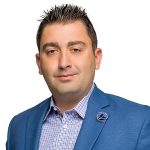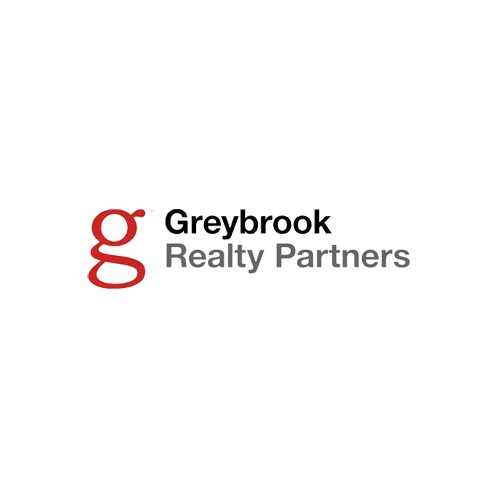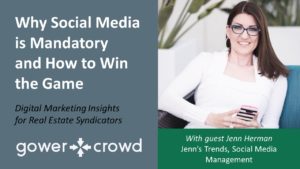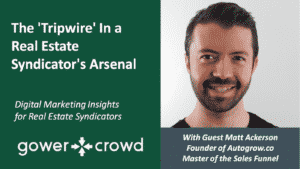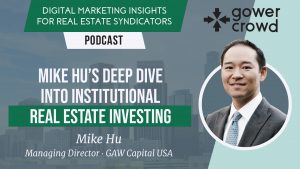426 Peter Politis, CEO of Greybrook Realty Partners
Lessons in excellence from a $20 billion real estate pro
 Peter Politis, CEO of Greybrook Realty Partners
Peter Politis, CEO of Greybrook Realty Partners
I have had the pleasure of working with Greybrook Realty Partners, a company that has been crowdfunding for a very long time, has $20 billion of projects under development, 8,000 active investors and one of the most finely tuned development and investor relations systems in the industry, and I am delighted to introduce you today to their CEO, Peter Politis.
Greybrook lead the industry in best practices in a number of key areas of real estate development.
Today’s podcast is unusual in that I know my guest and his company pretty well so what you’re getting in this episode are like the Cliff’s notes of best practices for how to operate a real estate crowdfunding company as I ask Peter specific questions that I know reveal guidance and insights you can use.
What You're Going to Learn
- How Greybrook Built a $20 billion Business
- Focus on a Common Goal
- A Center of Gravity for Sponsors
- Experts of the Long Haul
- An Eye to the Future
- Society Living
- Challenges and Opportunities
- Lessons in Business and in Life
- Putting people first at Greybrook
Related article: The Ultimate Guide to Crowdfunding Real Estate Development
Listen To or Watch the Full Podcast Here
Show Highlights
FOR REAL ESTATE DEVELOPERS
THE WHITE BOARD WORKSHOP
Learn the exact system best of class sponsors use to raise money online.
How Greybrook Built a $20 billion Business
Adam: Normally, I like to ask a very specific question, but you guys at Greybrook are so huge that I would like everyone that's listening, that one guy that's listening today, I would like him to know more about Greybrook.
Peter: Yeah, I mean, Greybrook has three principals and partners. It's a partnership that's, I guess, started off as a business relationship that's probably as close as family today, or more so in some cases. And we've taken that growth and culture. We're based out of Toronto, but we have offices in Toronto. We have a lot of developments in South Florida. We have an office actually in Tel Aviv in Israel and a satellite office in Vancouver. So for us, the company has grown in terms of scale and locations, but routed out of Toronto. I was actually born in Toronto, but I was raised in South Florida. I grew up in Miami. I went to school down there and then once the business was was formed, it was literally at some point almost 20 years ago, three guys and no employees, necessarily, we were, I was the CEO, the janitor, the secretary, the analyst, all those things. As we're as with Sasha, we were doing this and now we've grown to about 80 people right now or 85 people and all professionals on the investment development side and really some of the relationships that have formed have formed from people that we've had known most of our lives.
Peter: We have school friends that are general counsels who went and got their MBAs and their law degrees. We have our head of capital markets that went to University of Toronto with me. We, were fortunate enough and I was fortunate enough to meet a lot of really good smart people along the way that whether it was through school or personal relationships, that we met and when we had a vision of building a business, we thought what could be better than doing something we like with the people that we do like? And you know, we'll have a business meeting here on a Wednesday. If you come to my house on a Super Bowl party, you know, you'll see 30 percent of those people at my house for a party. And I think it's been a nice culture. It's what allows us to work so hard every day because it's a hard working culture. But when you're working and you're looking for the person that you're working for and how hard they're working for you, I think it makes it a lot easier.
Focus on a Common Goal
Peter: One of the times that you and I spoke before, I asked you a very specific question, what do you look for in a sponsor? How do you find new sponsors? And you responded by telling me, "Well, we don't really do that anymore. We have these relationships". Just describe that in the context of this idea that you're a kind of an integrated family. You have this deep network internally.
Peter: You know, the development community in Toronto is really small in a sense that the number of people who do things of scale are very well known organizations of people with very large balance sheets. By knowing the inner fabric of developers and development and what goes on, we've managed to form these partnerships that started off as business relationships 20 years ago that have now become personal relationships, and we've been led into this inner circle a long time ago, in this trusted inner circle, and we managed to say that we keep it to a tight circle. I mean, everything is done through such a collaborative way that they want to know what we think. They want to know if there's positive or negative.
Peter: They don't care what they're contractually obligated to do. And we're not cared with it. At the end of the day, we're all in it for profit and we're all in it for risk reward mitigations and all working towards a common goal. And when you've done that for so many years, it's now like you're just an extension of their own organization or their own family, their own friends. And now it's like, we want to be partners because we enjoy working together. And that's probably the best privilege that we have today is the people that we choose to work with. We actually have a choice and the people that we work with could work with us or anybody else in many cases. And we're lucky enough to have forged these relationships for a long period of time that we have a common goal of success and and we see eye to eye. There's not a lot of times when there's an issue or a problem and we try to dissect it where someone saying, we're saying white they're saying black, we've grown to each other's cultures over the years.
A Center of Gravity for Sponsors
Adam: With sponsors. What's what I find fascinating about Greybrook is that you have these relationships with a bunch of sponsors who, you - who are all independent, but you are some, you're like a center of gravity, you know which you know what each one of them is doing, and you're able to extract best practices. You learn something, you contribute to those relationships, but you are. You acquire best practices by seeing what individual sponsors are doing and then cross fertilize that across your network. Talk about that because that's incredible value-add that most sponsors like you don't have.
Peter: Yeah, I mean, I think that's a really important key that our ability to intimately know how every one of these large organizations run their business, and we can see how certain construction strategies work. We can see how they deal to negotiate with trades opposite the banks, broker relationships, what brokers are moving product in one developer's inventory, but not another, and why they're not and how we can go ahead and bring all these basically the biggest of the best that each one have to offer how we can. If someone isn't seeing things the right way, we can add value, our ability to do that because we've done and see it we can take the lead and actually be part of the execution team at different stages of the development. Whether it's city planning, whether it's financing, whether it's the disposition of assets, like all these things that we can step in, like we are not just like a resource of information, but we are an execution resource for our partners as well.
Experts of the Long Haul
Adam: Now you have 70, you mentioned 75 projects, 20 billion in development with a B. Just if anyone missed that, 20 billion in development. How many sponsors do you work with and what is kind of the life? What's the lifespan of those sponsors with you?
Peter: Yeah. So we've only done one project with one developer once in our nearly 20 years of history. Everyone else is, you know, multiple multiple projects. These I don't know that we have any relationships that are under a decade old, really. And for us, I think what is really important is that when we partner with somebody, their mentality is to partner with us on a number of things. There's not a lot of value in us how deep we get organizationally and get intertwined to do a deal, no matter how good or big one deal is.
Adam: How do you deal with that discussion when somebody says, "Wait a minute, I'm going to invest one hundred thousand and I'm not going to see anything for five years"?, how do you address that? And are you noticing it as being more prevalent that people are concerned about that? Is that a problem for you?
Peter: More people are looking to alternative investments than ever before. More people are looking to make investments that could generate a meaningful return than ever before. And the factual reality is that development can do that. You have to know what you're doing. You have to execute it properly, have to trust the person you're doing it. So those returns are available in this space. Now the question is, who do you do it with? If it's appropriate for your portfolio? You tell this whole story. At the end of the day. I think if you're a qualified investor for development, which again, not everyone certainly is, it's a compelling enough story to say, "yeah, it's worth the illiquid aspect for a portion of my portfolio", and that's really how we put it. We try to build a portfolio for people not, "here, give me a dollar for this. You should put every dollar you want to put in development for this one project".
An Eye to the Future
Adam: You are, as you've been describing, you are the investor. You aggregate. Forgive me if I'm using terms that you wouldn't use yourself, but you aggregate investor capital and then place it in substantial enough amounts with sponsors that you CAN negotiate rights and responsibilities. Talk about that. That's very interesting.
Peter: I mean, not only. A couple of things. Whether somebody writes a check for 20 million in a project or 50 thousand. All the terms, conditions are identical, so there's no class of shares. We negotiate the best deal for everyone. I don't care what your check size is, number one. Number two outside of the co-investment of our developing partner, we are 100% of the balance of the equity. Developments are like living, breathing things. Over the next half decade or three to seven years, however long these things are. The world changes many times over. So every decision of any kind of financial consequence is made on a unanimous basis with them and with us. So regardless of what a contract says, they can't go get financing, sell a unit, rent a unit, dispose of it, hire a construction manager, enter trade discussion. None of those things can happen. We're there day in and day out. Not just from a contractual beginning, because none of these investors would have any ability to know what's going on, what's changed good or bad, what critical decisions need to be made. And we talked with us earlier. The level of insight we can bring to our partnerships to help make the best, most informed, real time critical decision is like, I don't know how you quantify that in value at the end of the day. So for us, our job is to manage these things like really actively on an ongoing basis. Of course, we can negotiate the terms up front because the check that we're writing, but it's much more than that. Like, it's. Every day you need to be successful and make the right decisions throughout the course of many years in order to make a development successful on our view.
Society Living
Adam: When we first started working together, I knew that I was in trouble because I discovered society living and all I wanted to do, I told my wife, "Do you mind if I run away and move into one of these buildings"? They look so amazing. Tell me about society living. It's absolutely fantastic. What is it?
Peter: Yeah, this is something that we're super excited about. It's our multifamily ground up rental platform in partnership with PMG - Property Markets Group. That's a national platform today. And our idea is a couple of things. One, we look for major growth city. So we have stuff in Miami, Fort Lauderdale, Atlanta, Denver, PMG has stuff in Phoenix and Chicago and other places as well. And it's really we want to deliver a living experience in the best location in the city. But for the lowest total dollars and the answer is, well, that sounds next to impossible to do. And it's actually it's actually not. It can be a very successful financial model. These are luxury buildings that have essentially created these social environments where you may only be able to afford a bedroom even though you have your own bathroom and we have roommate matching, but you're living in an experience in these buildings, we have gyms that are the size of Equinox.
Peter: We have events like whiskey tasting and cooking classes, pool, bar, F&B, one of the newest amenities that we've been constantly putting in our new developments now is like a hair salon that's included in and as part of the the package of the rent. So it's essentially creating a living, a community where we kind of joke that we cure loneliness. But we put one of these assets up for sale and tremendous interest. And one of the institutions that really liked it. Toronto based institution that also works down in the U.S., they were really interested and they made a really funny thing, they're like, "we're not nearly cool enough to run this building. How can you guys help us run it after? Like, this is a this is amazing, but I don't know if I can do this"! And that's important. Like, we're creating these living experiences and by people knowing the society brand. They know that that's the level of experience that is whether you're living in society in Miami or in Wynwood or you're living in society in Denver, society in Atlanta or all these other places. I mean, this is what's really important that they know the type of product they're getting.
Challenges and Opportunities
Adam: So what are the biggest challenges that Greybrook faces at the moment, and how are you overcoming them?
Peter: Yeah, I think that development in itself is challenging because so many things move from time to time. I think inherently there's more variables in development. The challenge is that there's always a new challenge tomorrow and you don't always know what that is and you can't always pre plan for it. So I always tell all of our guys that our asset management team, our job is to be two things. Problem solvers and to enact results. That's our job. There's no autopilot in development. It's critical thinking all the time. How do you tie all the things together financially. We are making all these long term decisions and we have to weigh many, many things while making those decisions. That's the thing that is that we face all the time is we always have to be prepared for something that we didn't think about and how to tackle those problems.
Adam: Ok, so what are the biggest opportunities for Greybrook and where are you headed?
Peter: I think for us, one of the best things that we can offer our people is like broad based diversification. So I think we're going to continue to branch out into the different places that we invest because we said at the beginning. Our job is to create portfolios for these people. Our job is to continue having access to opportunities across a broad range of geographies because at the end of the day, that's how you create a balanced portfolio, I'm going to buy bonds or buy banks? I'm going to buy REITs, going to buy tech, buy all those things. I don't care how great Amazon is or Walmart or Microsoft or, well, whatever thing you think is the best stock, Bitcoin, or whatever you want. There is no company or long term investment portfolio or platform where you can only do one thing, and that's how we see the world. We want to do many things because at the end of the day, our job is to diversify risk and create kind of private equity like returns for our guys.
Lessons in Business and in Life
Adam: What are the key daily habits that you have that keep you successful?
Peter: Yeah, I think working hard is an important habit, and I think that most people don't realize how hard you need to work to be successful. And you know, it's kind of like the sports analogy, like hustle is a skill. Working hard. I find that a lot of people have these these generically large aspirations, but few are willing to work as hard as you actually need to or sacrifice as much as you need to to actually reach them.
Adam: And what's been the hardest lesson you've learned in real estate?
Peter: I think the hardest lesson is how long it all really takes to actually do. Everybody like people want instant gratification. They want results tomorrow. They want to buy a stock yesterday and make money today and move on and have this. It's you're telling a story to people. And at the beginning, people don't realize how long three, five, seven, eight years or how many years of work it is. Because that that is the lifeline of the business is the communication with our partners and our investors.
Adam: Now it's a funny thing you say the hardest lesson was how long it takes, but it's also reinforced when you look back when you close this 11 year deal and you;re just so happy you started it.
Peter: That's actually very, very accurate. And that's something that we talk a lot about here is that at the end of these, it's it's so important at the end of these projects to look not just to celebrate your successes, but to to see what we did, what decisions we made, how they affect our future decisions. And that at the end of the day, it's hard to do something for years and years and years before you get financially compensated. At the end of the day. We didn't talk a lot about this, but how Greybrook really makes their money is we make our money off sharing the profits. So when you're running an organization, you wait as many years as the investors wait to be compensated. That's what we wait to be compensated. And organizationally, that's something that it was. It was a lesson that you didn't appreciate enough at the beginning, but it's something very important when you're managing and running a business is understanding that.
Putting people first at Greybrook
Adam: If somebody were to tune into this podcast, it's not a radio show but just imagine it was, it was out live and that was it. And the only thing that they were to hear is what you say now about Greybrook, what would you want them to hear? What would you want them to take away?
Peter: I think what I want them to take away is that in any investing, you invest in people. I don't think that a project or anything along those like the numbers of a project are not relevant. The execution and the people that do it, I can show you the best corners of real estate that made no money in the wrong people's hands. I can show you mediocre things that were smashing successes with execution. And at the end of the day, in any business, you should invest in the people first. Obviously, the numbers have to make sense, and I think that we are the kind of people that people should align themselves with. We put our investors first, we co-invest alongside them at all these things and the experience that we bring to the table with the kind of people that we are, I think is what's made us successful. I think that that can't be overlooked.
A guide for remote workers
How to Setup a TV Studio Quality Home Office

